In This Issue
World Alzheimer’s Month: Community Changes Everything
Finding Strength in Numbers
Transformational Gift of Support
Provincial Government Partnership for First Link® Program
Navigating the Path Forward for Dementia
CEO Message: Thank You For Your Support
Research Forum – Let’s Go Beyond the Headlines
Dementia-Friendly Programming and Online Training
Ask an Expert – Resistance to Transitioning in Personal Care Homes
Mark Your Calendars: Fall Education and Support Groups
Strategies for Getting a Diagnosis
Dementia Care – Register Today!
The Winnipeg 10&10 Run is Back In-Person!
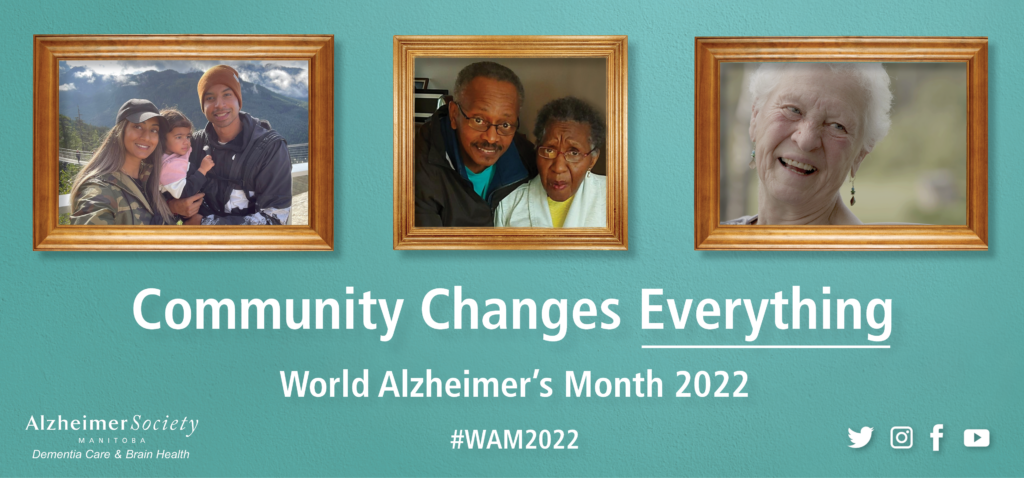
SEPTEMBER IS WORLD ALZHEIMER’S MONTH!
This September, during World Alzheimer’s Month, the Alzheimer Society of Manitoba wants to remind families impacted by dementia that they are not alone — Community Changes Everything.
The Alzheimer Society is your First Link® to a community of support, resources and a wealth of knowledge to help families in their dementia journey. No matter where you live, you have never been less alone in your diagnosis than today.
We’ll be showing our support for our global community on September 21st for World Alzheimer’s Day – will you?
Make sure to post your photos to social media, tag us and use the hashtag #WAM2022 so we can come support you!
Check out our full World Alzheimer’s Month page here!
Finding Strength in Numbers
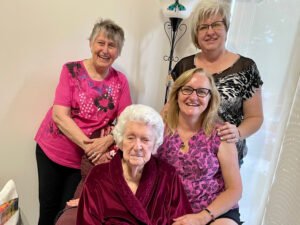
It’s been a rough ride over the past five years for Sandy Goran and her siblings as they try to support their 92-year-old mom through her journey with dementia… and that is why they are so grateful to the Alzheimer Society’s First Link® program.
The program connects people with dementia and their families to information, support services and education as early as possible, and throughout the progression of the disease.
“I would have cracked without Liz,” admits Sandy, referring to Liz McLeod,
Senior Manager, Regional Services from the Westman office located in Brandon.
“She supports us so much with educational information, reassurance, regular Zoom meetings and connections to other support services. She keeps us working together and supporting each other,” says Sandy, who lives in Gilbert Plains.
Their mom, Shirley Whyte, raised her three girls in Dauphin. She lived on her own for many years after she lost her husband, taking good care of herself and her house. She loved it when her family visited or took her to the cottage.
But in 2017, Shirley’s behaviour began to change. She developed routines and couldn’t cope if they were interrupted. If she didn’t do tasks for a while, she forgot how. She became increasingly preoccupied about certain things.
By 2020, she could not keep her medications or finances straight and it became apparent she was no longer safe living on her own. Covid restrictions resulted in extreme loneliness and a lack of access to services, making things even worse.
The struggle to find a suitable place to care for her was extremely difficult. There was no place available in Dauphin and Shirley was very resistant to moving out of her home. It had been her safe haven for 58 years. “I look at it this way. Change is hard, and change you don’t want is even harder,” says Sandy, who with her sisters Carolyn Gordon in Swan River and Barbara Henderson in Brandon, had to make some tough decisions.
Ultimately, in February 2021, the family agreed Shirley should move to an assisted living facility in Brandon. It was and continues to be difficult, but it is for the best, the sisters agree, adding with Liz’s support, they know they’re making the right decisions.
“Your strength is often drained when dealing with situations and decisions. Getting the support you need is critical,” says Carolyn. “The Alzheimer Society has provided our family with that much needed strength and support as we travel this journey with our mom.”
RETURN TO TOP OF PAGE
Transformational Gift of Support
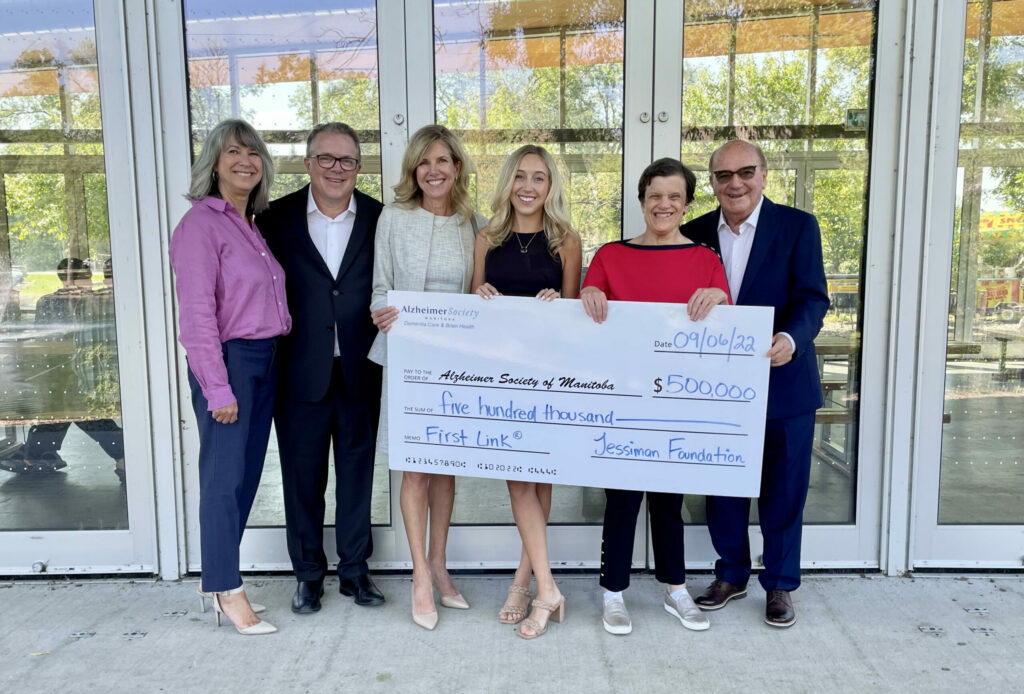
During the pandemic, the Alzheimer Society identified an increasing gap: the need for support had grown beyond what our existing First Link® staff could provide. First Link is our pillar program that connects people with dementia and their families to information, support, services and education as early as possible and throughout the progression of the disease.
An earnest search began for a multi-year commitment from donors to fund this much-needed growth. To our delight, the Jessiman Foundation generously stepped up to champion our one-million-dollar campaign with a $500,000 gift over four years.
“Dementia has touched our family, just like so many other Manitobans,” says Dana Jessiman. “We didn’t think that we would need their support and then all of a sudden, we did. We are immensely grateful to, everyone at the Society for the help we received as a family and for all of the great work they do for Manitobans across the province.”
The Jessiman family challenged the community to join them in their support of the Alzheimer Society’s First Link program. The community stepped up, and in a matter of months, their gift was matched.
This funding is transformational for the Society and has already allowed us to significantly increase the number of staff, almost doubling our capacity to connect with families and provide the support they need.
“To know there is an organization to help those who are diagnosed, as well as their family members and support network, is incredible. The number of people impacted is shocking and it’s only increasing. We have a long way to go to ensure these resources are available to everyone in Manitoba,” emphasizes Peter Jessiman.
The next step in our campaign will be an additional $300,000 focusing on outreach and expansion of our education programs.
“This generous gift and ongoing campaign mean families impacted by dementia can continue to have a place to turn for knowledge, compassion and support,” says Wendy Schettler, CEO, Alzheimer Society of Manitoba.
Heart-felt thanks is extended to the Jessiman Foundation and the rest of our long-time donors who stepped up when our need was the greatest.
Provincial Government Partnership for First Link® Program
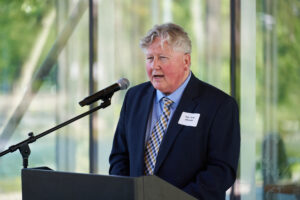
The Government of Manitoba has announced their partnership and support for the Alzheimer Society of Manitoba’s First Link® program with a $1,300,000 commitment over the next four years.
“We are beyond excited to receive this multi-year funding from the provincial government for our First Link® program,” says Wendy Schettler, CEO, Alzheimer Society of Manitoba. “The province has been a valued partner of this program for over a decade now and it is vitally important that we continue the expansion of First Link® so families have a place to turn to for support and information throughout their dementia journey.”
Spurred on by the generous gift from the Jessiman Foundation, this new funding will allow the Society to continue the growth of their First link program which connects families impacted by dementia with resources and support early and throughout the progression of the disease to help them develop competency and resiliency when facing this journey.
“We are proud to continue our partnership with the Alzheimer Society of Manitoba in support of families living with dementia,” says the Honourable Scott Johnston, Minister of Seniors and Long-term Care, Manitoba Government. “This also contributes to the development and implementation of our provincial seniors strategy through the resources and services offered by the Society that help families with dementia stay in the community longer.”
According to the province, the seniors strategy aims to make the province an ideal place to age so that seniors can live a healthy and active life, safely and independently and in their own homes and community for as long as possible.
The Alzheimer Society of Manitoba plays a pivotal role in this by providing support for people with dementia and their families to safely remain in their community longer. When the time comes, they also provide guidance for the difficult transitions between living settings.
“This funding allows us to continue supporting families every step of the way,” says Wendy. “Nobody should have to go through this alone.”
Navigating the Path Forward in Dementia
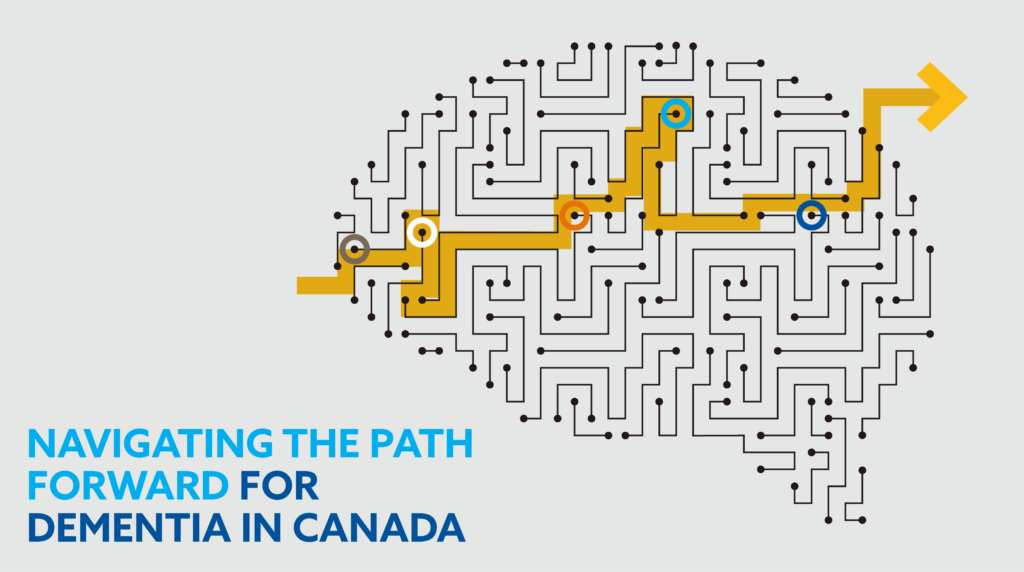
The Alzheimer Society of Canada has launched the first in a series of three reports known as The Landmark Study.
These reports represent the first significant update on Canada’s dementia landscape and projections on the future since 2010.
The first report, titled “Navigating the Path Forward for Dementia in Canada” includes forecasts on the number of people in Canada expected to be living with dementia over the next three decades. This includes a national breakdown, based on sex and type of dementia, as well as forecasts for each province.
According to The Landmark Study, Manitoba currently has 18,400 people living with dementia and by 2050, it is expected to reach over 39,100.
The study also looks at the impact of Canada’s ageing population on care partners, who are often family members of people living with dementia, who will be facing increasing demands on their time to look after their loved ones.
The report also outlines steps that government at all levels, as well as individuals, can take to help mitigate the risk of becoming a person living with dementia. Delaying the onset of dementia by even one year will offer significant benefits to our health care system and the people who serve as care partners.
For further information and to view the full Landmark study report volume 1, visit the Alzheimer Society of Canada’s website here. Subsequent reports, focusing on ethnicity and dementia and economic costs, will be released later this year.
CEO Message: Thank You For Your Support

The Alzheimer Society walks alongside families living with dementia from an uncertain and worrisome time of noticing the early signs of dementia right- through to the late stages and end of life decisions. We provide support and resources every step of the way.
A new report, titled The Landmark Study, gives us a look at new dementia stats for the first time in over decade. It shows us that the number of people with dementia in Manitoba is growing fast. With more people being impacted by dementia, services need to be in place to help guide and support Manitobans who will join so many others who have walked this path. It’s going to hit us hard. The system is already struggling to keep up.
The pandemic added an additional level of complexity to the challenges people with dementia face, which means we spend more time on calls to help sort through these complex and challenging situations.
As the need for our services and time increased exponentially, we simply could not keep up with the number of new clients and increased number of complex phone calls. We desperately needed significant funding to increase our First Link® staff, so we can continue to support families in a meaningful way.
The Jessiman Foundation stepped up to champion our campaign with a leadership gift of $500,000 over the next four years and asked Alzheimer Society donors to join them. Our community of long-time donors responded by matching the Jessiman’s gift, almost doubling our capacity to connect with families and provide the support they need.
When the Alzheimer Society of Manitoba approached the provincial government to partner on this important initiative – they answered the call with an additional funding commitment of $1,300,000 over the next four years. It’s incredible and inspiring to see everyone rally together to support families living with dementia.
This funding helps to provide services for the people who need it now. The numbers are continuing to grow and we are just playing catch up. We need to look to the future and expand further, before the numbers overwhelm us again.
The next step in our campaign will be an additional $300,000 focusing on outreach and expansion of our education programs. We need to connect with a more diverse population in Manitoba and continue to be there for families during every stage of their journey.
Let’s Go Beyond the Headlines!
 We’re back this World Alzheimer’s Day for, “Beyond the Headlines: Uncovering Dementia Myths,” a research forum on Wednesday, September 21st from 6:30 – 7:45 pm via ZOOM.
We’re back this World Alzheimer’s Day for, “Beyond the Headlines: Uncovering Dementia Myths,” a research forum on Wednesday, September 21st from 6:30 – 7:45 pm via ZOOM.
News about research findings are often nuanced with different factors to consider, making it difficult to decipher which studies are exciting and promise hope, and which exaggerate and sensationalize results to gain more attention-leading to misinformation.
From believing that aluminum in pots and pans can cause dementia to believing dementia is a normal part of aging, we’ve come a long way in our understanding of myths about dementia. Research has uncovered fascinating discoveries and disappointing conclusions.
To shed more light on research headlines and bust some of the myths that are out there, Dr. Donald Weaver is back by popular demand to uncover topics such as post-COVID brain fog, cannabis as a treatment, Alzheimer’s disease as an autoimmune disease, an update on Aducanumab and more! Register online today for this popular and engaging presentation.

Sponsored by Brightwater Senior Living of Winnipeg
This event is supported in part by the Nathan Stall Endowment Fund.
For more information, contact us at [email protected] or call 204-943-6622.
Dementia-Friendly Programming and Online Training
 The world can be a pretty daunting, confusing place for all of us at times… but it can be especially so for people with dementia.
The world can be a pretty daunting, confusing place for all of us at times… but it can be especially so for people with dementia.
It’s why the Alzheimer Society has developed dementia- friendly community programming for families living with dementia. In addition, new online training resources have businesses and organizations creating their own dementia-friendly environments.
Dementia-Friendly Community Programming
Dementia-friendly programs bring those with dementia and their caregivers together to enjoy time learning, creating or exercising in an inclusive environment. People get to socialize, learn from each other and support one another during their time together.
Programs include Art to Inspire at the Winnipeg Art Gallery, Vivace Voices Choir at the Canadian Mennonite University, Tales Along the Trail at FortWhyte Alive, Journeys Through the Zoo at Assiniboine Park Zoo, A Journey in Time at the Manitoba Museum and our very own Minds in Motion program.
“Our vision is of a community that respects, supports and empowers people with dementia,” says Jennifer Vicente-Licardo, Alzheimer Society of Manitoba’s Education Manager. “A community where people with dementia actively participate in a safe environment,” she adds.
The goal is to make participants feel welcome and included in the community while smashing the stigma that can come with
dementia.
Online Training Course
Through the new online course, Building Dementia-Friendly Communities, those working in several targeted sectors learn about the challenges faced by people affected by dementia, along with actions that can be taken to make public places inclusive.
“The course gets participants thinking about things like accessibility of both the physical and social environments, as well as how to support someone with dementia through effective communication,” says Jennifer.
The course provides a foundational knowledge of dementia and considerations that organizations can change in their social and physical environments to better support and include people living with dementia.
Whether it’s providing programs for those with dementia, or helping companies learn how to provide dementia-friendly service, the most important consideration is how it’s offered.
“It’s all about reducing barriers that prevent participation in society,” says Jennifer. “The whole idea is getting people on the same page by using language and strategies that will support people with dementia as they are out and about in their communities.”
To learn more about the Fall education programming, visit out website here: https://alzheimer.mb.ca/we-can-help/education/family/family-education/
To learn more about the Building Dementia-Friendly Communities course, visit our website here: https://alzheimer.mb.ca/building-dementia-friendly-communities-online-course/
Ask an Expert: How do we begin transitioning my dad into a personal care home when he doesn’t want to move?
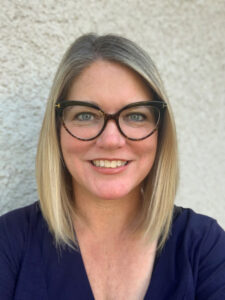
When thinking about the future, it can be almost impossible to anticipate how complicated things can become, and sometimes we make promises that we can’t keep. Although it makes sense to try and have someone at home as long as possible, you cannot predict the future and sometimes plans have to change.
If the care needs are more than you can provide, a care facility can be a loving choice, allowing for safety and needs to be met, and enabling selfcare too. It can be very difficult, but many people find that handing off the care provider role allows them to reconnect with the person in important ways that may have been lost to burn out and stress.
Here are some things to keep in mind as you approach the discussion:
• Be honest about what you can and cannot provide. No one can be a good caregiver if they are running on empty all of the time.
• Look into other resources to see if they meet his needs (e.g. public/private home care, other safety systems.)
• Involve him in the decision process and tour some homes together.
• Discuss it from a place of caring rather than expressing frustration.
• Get the whole family on the same side. This may require honest discussions about workload.
• Enlist the support of a respected third party like a doctor, community leader or spiritual advisor.
• Give it time. This decision is a process.
• Keep in mind that if people have the capacity to make their own decision, they have the right to make decisions that we don’t agree with.
It is not easy, but they will almost certainly adapt, and often more readily than you expect. The Alzheimer Society has some online tools that you can use when considering a move to long-term care. Visit alzheimer.mb.ca for details.
Terri Bowser, RN, BN, Regional Educator, Rehabilitation, Healthy Aging and Seniors Care
Mark Your Calendars – Fall Education and Support Groups

We’re back in-person! Come join our education sessions as we cover a wide range of topics – from the progression of dementia to legal and financial matters. The sessions are geared towards helping people with dementia and their caregivers be confident on their dementia journey. Here’s what’s coming up:
Living with Dementia First Steps: Part 1 (virtual and in-person)
– the progression of dementia
– exercises to experience what dementia might feel like
Saturday, September 10, 10 – 11:45 am
Alzheimer Society of Manitoba Boardroom, 10-120 Donald Street, Winnipeg
Location/Parking Details
Click here to register for the in-person session.
Click here to register for the virtual session.
Conversations about Driving (virtual and in-person)
Wednesday, September 28, 2 – 3 pm
Transcona East End Community Centre, 517 Pandora Ave. E, Winnipeg
Google Maps Directions
Click here to register for the in-person session.
Click here to register for the virtual session.
Check out all available in-person and virtual family education sessions on our website!
Virtual and In-person Support Groups
For Care Partners: A variety of days and times are available for those interested in joining a virtual or in-person support group for care partners. These groups help connect people with others living in a similar situation during these uncertain times. Click here to register for a date and time that suits your schedule.
Ambiguous Loss Support Group for Care Partners: Ambiguous loss is a type of loss felt when a person with dementia is still physically here, but may not be mentally or emotionally present in the same way as before. This support group is an eight-week program to help care partners navigate this type of loss. For more information or to add your name to the waitlist for the next available session, please contact:
Samantha Holland
Interlake-Eastern Regional Coordinator
204-268-4752
[email protected]
For People with Dementia: We are holding virtual and in-person support groups to ensure continued access to support and information during the pandemic. These weekly groups for people with dementia provide participants an opportunity to:
- Learn about living with dementia and its progression.
- Share feelings and common experiences.
- Exchange practical coping strategies.
- Participate in discussions.
For more information about support groups for people with dementia, please contact:
Sarah Dueck
Client Support Coordinator
204-943-6622 ext. 213
[email protected]
Strategies for Getting a Diagnosis
 What do you do when you see someone you care about begin to show signs of forgetfulness or disorientation? And what if that person does not want to seek professional help?
What do you do when you see someone you care about begin to show signs of forgetfulness or disorientation? And what if that person does not want to seek professional help?
“Any changes in thinking—even if they seem too mild to make a diagnosis, and regardless of their age— are worth discussing with a primary care provider,” says Dr. Elizabeth Rhynold, a geriatrician in practice in the Prairie Mountain Health region. Dr. Rhynold will be among the panelists speaking at the Alzheimer Society’s 2022 Care4u Family Conference.
There are other options to consider, she says.
“If symptoms are developing, it’s an important time for a family member to start regularly attending medical appointments with the person. You can frame it as ‘when you’re being asked questions and put on the spot it can make memory worse so I can help you’.”
Keeping track of the changes you are noticing is really important. Describe specific incidents and record the dates they occur, Dr. Rhynold suggests. If you will be accompanying the person, you can share what you’ve observed with their primary care provider. If they are unwilling to let you accompany them, you can suggest they take your notes with them to their doctor visit as a way of providing a detailed account of the cognitive changes.
If you can’t attend the appointment, you can still let the doctor know what the visit is about, says Dr. Rhynold. “A health care provider can receive information from anybody without breaching confidentiality, so a concerned family member can write a letter saying what they’re observing, and that’s when those detailed notes are critical. That way, it can at least go into the electronic health record, relieving some of the worries in the minds of family members.”
And ultimately, says Dr. Rhynold, if things become truly unsafe, “it’s essential to the wellbeing of the person to call 911 for an ambulance or the RCMP, because the person may not understand the risk they’re putting themselves in.”
To register for Care4u 2022, visit alzheimer.mb.ca/care4u or call 204-943-6622 in Winnipeg or 1-800-378-6699 in Manitoba.
Essentials of Day-to-day Dementia Care – Sponsored by All Seniors Care
We’re excited to invite you to our Dementia Care Professional Development Series! Sessions are geared towards health care staff and take place online monthly until March 2023.
 Join our next session on Thursday, September 15 from 2 – 3:30 pm called To Respond or Not to Respond? A Systematic Approach to Understanding Responsive Behaviours featuring Sylvia Davidson where she will share her systematic approach, a framework for understanding responsive behaviours, and discuss various strategies that can be helpful when responding to changes in behavior, with a focus on enhancing care.
Join our next session on Thursday, September 15 from 2 – 3:30 pm called To Respond or Not to Respond? A Systematic Approach to Understanding Responsive Behaviours featuring Sylvia Davidson where she will share her systematic approach, a framework for understanding responsive behaviours, and discuss various strategies that can be helpful when responding to changes in behavior, with a focus on enhancing care.
This professional development series, which started in April, is focusing on the foundation for successful and meaningful dementia care that will benefit the person with dementia, their families and the healthcare system as a whole. For a $20 registration fee, you can watch all remaining 8 live presentations and access to recordings of all 11 sessions!
Visit our website today for upcoming sessions, speaker bios and to register today!
The Winnipeg 10 & 10 Run is Back In-Person!

The Winnipeg 10 & 10 Run is back in person! Join them on September 11th at 7:30 am at Memorial Park. Pick your length of race – from 5k, 10k, 10 mile or 30k!
If you’d rather move your own way, they are also hosting a virtual version from September 9th to October 3rd.
Learn more about the event by checking out the Running Room Website
A portion of funds raised goes to the Alzheimer Society of Manitoba.
For more information please contact Chris Walton.
Remember. You Are Not Alone.
We are here to help you and your family no matter where you are in your dementia journey. You can reach a comforting ear by phone or get a quick response by email. Call us at 204-943-6622 (Winnipeg), 1-800-378-6699 (toll free in Manitoba) or email [email protected]
